 Health science and technology are advancing rapidly. That simply means that there are always new ways to improve your health and wellbeing. One insight that has come from recent health research is the danger of too much blue light, particularly when it comes to the brain. These days, blue light is everywhere, constantly emitted from your computer screen and smartphone. Evidence suggests this may be having devastating effects on your metabolism, sleeping patterns, eye health, and energy levels. And while this is important information for everyone, it’s even more vital if you suffer from Adrenal Fatigue Syndrome (AFS) and would like to minimize sources of stress.
Health science and technology are advancing rapidly. That simply means that there are always new ways to improve your health and wellbeing. One insight that has come from recent health research is the danger of too much blue light, particularly when it comes to the brain. These days, blue light is everywhere, constantly emitted from your computer screen and smartphone. Evidence suggests this may be having devastating effects on your metabolism, sleeping patterns, eye health, and energy levels. And while this is important information for everyone, it’s even more vital if you suffer from Adrenal Fatigue Syndrome (AFS) and would like to minimize sources of stress.
Before diving into the health benefits and potential dangers associated with blue light, you first need to know what blue light is. Light is made up of several wavelengths of different colored light including blue, red, orange, yellow, green, indigo, and violet. Each color has different wavelengths and contains different amounts of energy. More specifically, long wavelengths contain less energy and shorter wavelengths have more energy. This means that red light, which has a long wavelength, is relatively low in energy. On the other hand, blue light has a shorter wavelength and therefore, more energy.
In our evolutionary past, the only source of light was the sun. So, our ancestors made use of all the light they needed during the daytime. But this all changed with the advent of technology. Today, computers, phones, tablets, and even fluorescent lighting all emit blue light, which means most people are exposed to more of this light than ever before. This short-wavelength light can adversely affect your health in a variety of ways. This last point is even more important if you suffer from AFS and are trying to rebalance your body’s circuits while preventing harmful toxins from placing more stress on your body.
If you suffer from AFS, a combination of stressors and your body’s inability to cope with those stressors can cause widespread problems throughout your body’s many interconnected circuits. There are six circuits in total, each comprised of three main organs or components. If you’re healthy, these organs work together effectively to perform their required duties. However, this interconnectedness has a dark side, too. When one organ or system in the circuit is damaged or becomes dysregulated, it can lead to problems in all of the other organs and circuits as well. This is a dangerous situation, yet extremely common if you suffer from AFS.
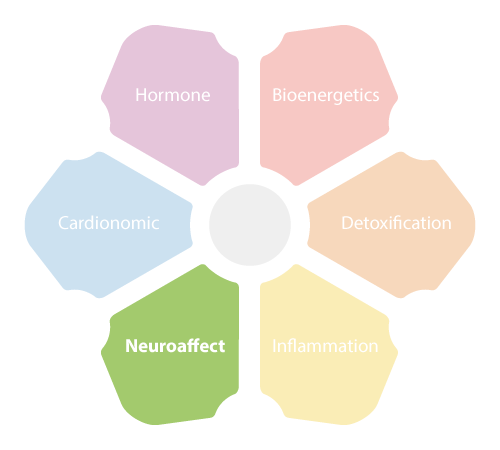 Chronic stress is the result of everyday exposure to stressors like environmental toxins, problems at work, relationship troubles, and poor lifestyle choices – but your body is not equipped to deal with these types of stress. To manage short bursts of stress, your body’s NeuroEndoMetabolic (NEM) Stress Response is activated and prepares your body to either fight or flee. One major part of the NEM Stress Response is the release of the stress hormone cortisol from the adrenal glands. Cortisol is responsible for the burst of energy you get in emergency situations. Unfortunately, your body just doesn’t have the right systems or responses to cope with the chronic stress that you just can’t escape from.
Chronic stress is the result of everyday exposure to stressors like environmental toxins, problems at work, relationship troubles, and poor lifestyle choices – but your body is not equipped to deal with these types of stress. To manage short bursts of stress, your body’s NeuroEndoMetabolic (NEM) Stress Response is activated and prepares your body to either fight or flee. One major part of the NEM Stress Response is the release of the stress hormone cortisol from the adrenal glands. Cortisol is responsible for the burst of energy you get in emergency situations. Unfortunately, your body just doesn’t have the right systems or responses to cope with the chronic stress that you just can’t escape from.
Chronic stress is all too common in the modern world. It can be caused by a combination of lifestyle factors, environmental toxins, poor diet, and a lack of exercise. Each person has their own stress tolerance level, but once your body reaches its limit you could end up with AFS. With Adrenal Fatigue, your adrenal glands may struggle to keep up with the body’s demand for cortisol. Eventually, your body’s circuits become unbalanced leading to a strange combination of symptoms. These circuit imbalances place even more stress your body and increase your body’s demand for cortisol even further, making the original problem worse. If these problems are not addressed, the end result can be dangerous – maybe even deadly.
The Neuroaffect Circuit comprises the brain, the autonomic nervous system (ANS), and the microbiome or bacterial community in your gut. Neuraffect Circuit dysfunction can cause neurotransmitter imbalances, gastrointestinal (GI) problems such as infections or issues with digestion and elimination, and overstimulation of the ANS. You may even experience symptoms associated with mood disorders such as anxiety and depression. Certain neurotransmitter levels—in particular, epinephrine or adrenaline—increase in response to high stress levels and this can leave you feeling ‘wired and tired’ and unable to relax or sleep properly. Often, these problems often occur during the later stages of AFS, but patients in the early stages may also start to show signs of Neuraffect Circuit dysfunction.
Once the Neuroaffect Circuit starts to show clear signs of dysregulation, it’s vital to seek professional help as soon as possible. If unaddressed, these imbalances can contribute to further stress on your body and lead to an overwhelming level of toxicity. At this stage, your AFS absolutely must be addressed or you will place yourself at risk full body shut down and the possibility of other serious health threats.
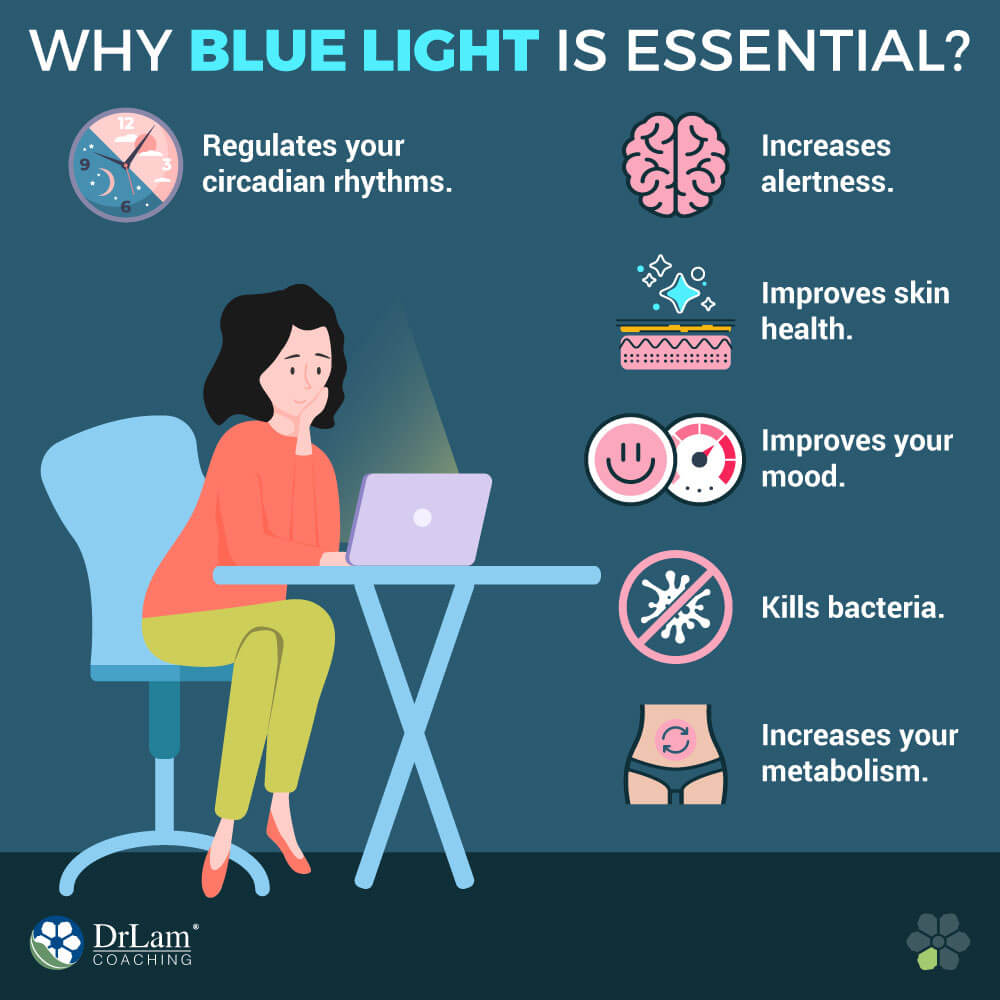
You shouldn’t try to completely eliminate or protect yourself from blue light. In fact, the range of wavelengths in blue light is essential for your health and for several functions in your body. Here are some of the benefits:
Your circadian rhythms are the physical, behavioral, and mental changes in your body that follow a daily cycle. This includes hormone secretion, your sleep/wake cycle, cellular functions, and gene expression. The circadian rhythms respond to light and darkness and blue light may be, in part, what causes this response. The light spectrum is sensed by your body and may enable it to sync with the 24-hour day. If your circadian rhythms are out of sync, this can lead to a variety of problems including mood disorders, certain cancers, and metabolic dysregulation.
Blue light is often used as a therapy for improving the symptoms of depression and seasonal affective disorder (SAD).
The blue light spectrum can help kill bacteria. It has been used to successfully kill the bacteria responsible for gastritis as well as those that cause gum disease.
Blue light is often used to reduce inflammation and treat skin problems such as acne, psoriasis, and keratosis.
If you experience daytime tiredness or find it hard to stay alert throughout the day, exposure to this light spectrum may help.
Since this light spectrum affects circadian rhythms, it can also increase your metabolism, which could boost your energy levels.
All these benefits are extremely important if you suffer from AFS. However, it’s rare that anyone living in the Western world is getting inadequate levels of blue light owing to the widespread use of technology. Instead, the opposite is far more likely to be true. And, like most things, getting too much blue light isn’t good for you either.
 Health experts are increasingly concerned about the effects of blue light on the eyes because your eyes are not particularly good at blocking this wavelength. Structures located at the front of the eye, including the cornea and lens, are excellent at blocking other types of light. That’s why less than 1 percent of UV radiation from the sun reaches the back of the eye. Wearing sunglasses can protect you from the remaining UV rays that get through and will protect you from cataracts and other problems associated with sunlight. However, the lens and cornea don’t block blue light. So, nearly all of it reaches the retina at the back of the eye, which triggers nerve impulses that travel to the brain in response to the light.
Health experts are increasingly concerned about the effects of blue light on the eyes because your eyes are not particularly good at blocking this wavelength. Structures located at the front of the eye, including the cornea and lens, are excellent at blocking other types of light. That’s why less than 1 percent of UV radiation from the sun reaches the back of the eye. Wearing sunglasses can protect you from the remaining UV rays that get through and will protect you from cataracts and other problems associated with sunlight. However, the lens and cornea don’t block blue light. So, nearly all of it reaches the retina at the back of the eye, which triggers nerve impulses that travel to the brain in response to the light.
Studies have shown that too much blue light exposure can damage light sensitive cells in the retina. The resulting damage is similar to macular degeneration and can result in permanent and irreversible vision loss. This is a huge problem because it means that using smartphones and computers may lead to serious vision problems later in life. And because of the current popularity of these devices, as well as the ever-increasing number of hours many people spend on them, this could present a serious health threat.
Mitochondria are found in large numbers in every cell and are essentially factories that produce and store energy inside the cell. However, they have other functions, too. Mitochondria are responsible for your body’s fight-or-flight response. So, if you’re stressed, they give your body the energy it needs to react – and hopefully, survive. These organelles are also responsible for the human urge to reproduce and to eat in case of a future famine.
Unfortunately, blue light can damage or inhibit cell function. Studies have shown it can also increase the number of free radicals in your body – unstable molecules that cause damage to cells and to DNA. These molecules are often produced by oxidative stress and can speed up aging and cause other health-related consequences. Moreover, free radicals can damage mitochondrial DNA, which affects the energy of cells, their function, and may even lead to cell death.
If you are suffering from AFS, this can have some seriously troubling implications including:
The low energy levels caused by AFS can be compounded by overexposure to blue light.
The only way to recover from AFS is to remove the sources of excess stress and toxins from your body and lifestyle, thereby providing your body with the space it needs to heal. But if overexposure to blue light impairs healing, your recovery will take a lot longer – if it’s possible to recover at all.
Blue light can increase the number of free radicals in your body, which can result in more cell damage. This can pose serious problems if you suffer from AFS, since the condition also causes a free radicals and other toxins to build up in the body. This toxic mix is usually cleared by the detoxification circuit however, detoxification circuit dysfunction can impede or even halt this essential work. As a result, many people with AFS have a buildup of damaging metabolites and free radicals in their body. To combat this, your body increases inflammation in an attempt to expel toxins but this only leads to further toxic build-up, increased stress, and overworks the adrenals even more. This is the last thing you want if you’re suffering from AFS.
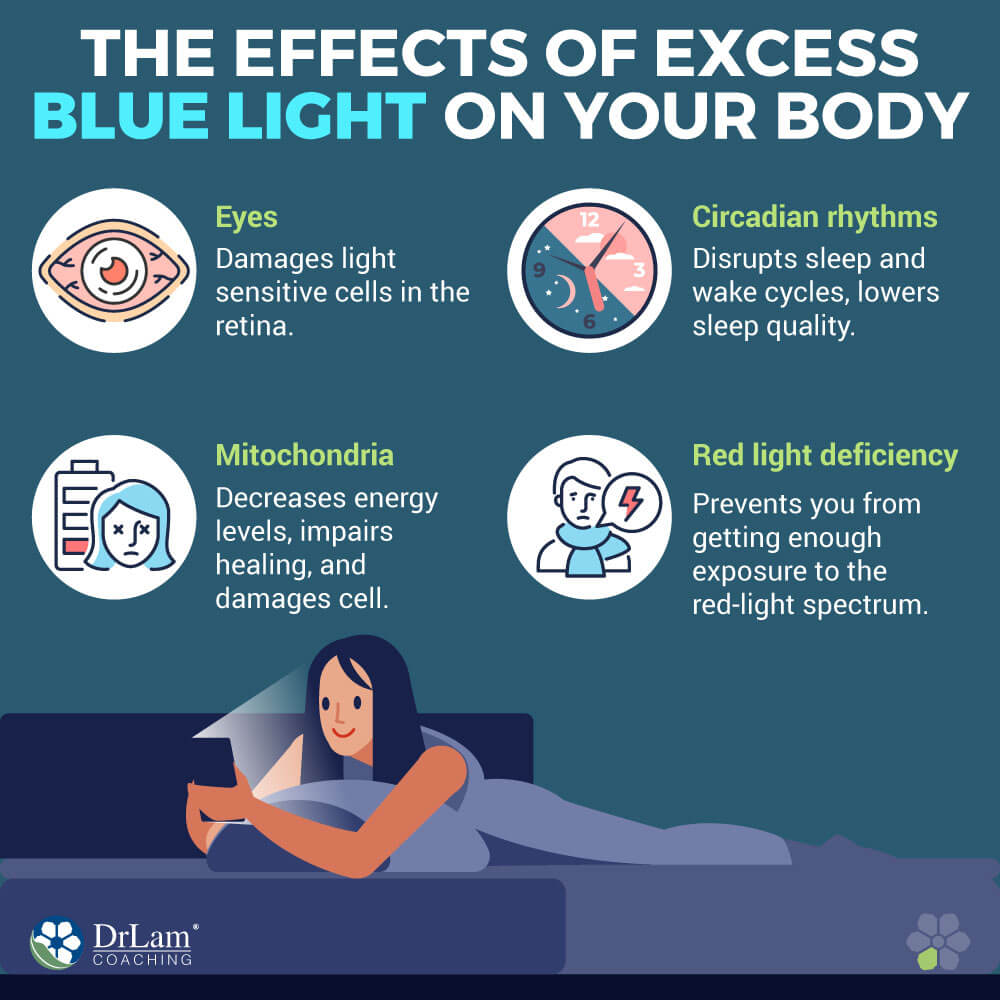
Blue light is essential for health and regulates circadian rhythms. However, too much of this light spectrum or exposure at the wrong time of day can have devastating effects on your body’s natural rhythms. This has to do with the so-called melanopsin receptors found in cells of your eyes. These receptors contain more mitochondria than in any other cells in the body. Importantly, around 5 percent of these cells are not connected to the visual cortex but are instead linked to a group of cells in the hypothalamus—called the suprachiasmatic nucleus (SCN)—that control your circadian rhythms. The cells are larger than normal and sensitive to the blue, green, violet, and amber light spectrums. So, when they are exposed to too much blue light, they grow slowly and your circadian rhythms can be affected.
Too much blue light can also inhibit melatonin production. The hormone is secreted at night and strongly connected to your sleep and wake cycles. Studies have shown that when melatonin is inhibited by blue light, it not only affects how long you sleep but also the quality of sleep. So, those affected may find if more difficult to fall asleep, often sleep poorly, or wake up too early.
 Quality sleep is essential for a healthy body and successful AFS recovery. Lack of sleep or poor-quality sleep can contribute to high stress levels and increase free radical production, which can both worsen the symptoms of AFS. However, owing to the symptoms AFS, you may struggle to get the sleep you need and overexposure to blue light will only make matters worse.
Quality sleep is essential for a healthy body and successful AFS recovery. Lack of sleep or poor-quality sleep can contribute to high stress levels and increase free radical production, which can both worsen the symptoms of AFS. However, owing to the symptoms AFS, you may struggle to get the sleep you need and overexposure to blue light will only make matters worse.
Ongoing insomnia or poor-quality sleep is one of the most common and complex problems associated with AFS. The problem may be due to imbalances in the neuroaffect circuit and the resulting neurotransmitter imbalances. These imbalances are more common than you might expect, even among healthy people, mostly because they are so hard to diagnose. Clinical tests are not a reliable indicator of a problem, even if they reveal low neurotransmitter levels, because so many factors can affect neurotransmitter levels in the blood. Imbalances within the Neuroaffect Circuit can impede the production and appropriate use of neurotransmitters. Several types of imbalances can cause sleep disruption.
Serotonin is an essential neurotransmitter that helps create melatonin, which promotes sleep. However, excess cortisol levels inhibit serotonin production. Less serotonin means less melatonin. This is a common problem in AFS because increased stress levels trigger increased cortisol production. So, when your body is stressed, the last thing it wants to do is sleep. That’s why insomnia is common in those suffering from AFS.
Gamma aminobutyric acid or GABA is another neurotransmitter essential for sleep, but GABA levels can become unbalanced due to dysregulation of the Neuroaffect Circuit. Low levels of GABA can occur alongside low serotonin levels or may occur on its own. Either way, your sleep can be affected. Low GABA levels can cause anxiety, problems going into a deep sleep, frequent waking, and restless sleep. To make this situation worse, low GABA can also bring about low serotonin levels. So, if you are deficient in this neurotransmitter as a result of AFS, your sleeping problems may be exacerbated.
Norepinephrine is essential for the fight-or-flight response. When your body releases cortisol in response to stress, this is the neurotransmitter that is produced in response. If you suffer from AFS, you probably have a higher than normal norepinephrine levels in your system, which can leave you feeling wired and tired. If you don’t get rid of the stressors, the situation will only worsen.
If you don’t find a way to relieve high stress levels, your body may start releasing epinephrine, which is an even more potent neurotransmitter. Epinephrine stimulates the ANS and prepares your body to fight or flee from the danger. If you’re stressed out for a long period of time, your ANS remains active. This extremely unnatural state can lead to serious problems including anxiety attacks, sleep disorders, and can disrupt your circadian rhythms.
Imbalances in the Neuroaffect Circuit can lead to serious and ongoing problems associated with your circadian rhythms, such as poor sleep, mood disorders, and other problems that will lead to further imbalances in the circuit and increased stress levels. That’s why you should quickly eliminate any sources of stress or imbalances in the Neuroaffect Circuit. Blue light can have damaging effects on circadian rhythms and sleeping patterns. Too much of this light can threaten the balance of this circuit if it’s already imbalanced or sensitive due to AFS. So, if you watch a lot of television, spend all day on a computer, or play on your phone a lot, it’s definitely something you should address. By reducing your exposure to blue light you’ll be taking an important step towards rebalancing your Neuroaffect Circuit, reducing stress, and supporting your body on the path to better health.
 Women hoping to get pregnant are at risk from blue light. The ovaries have more mitochondria than other tissues in the body. In a sense, this is very practical. Since mitochondria cells are environment sensing organelles, it’s likely they are found in such high numbers to enable the ovaries to sense the environment and determine whether it’s safe to reproduce. So, if mitochondria are damaged, you may have difficulty reproducing or experience problems with your menstrual cycle.
Women hoping to get pregnant are at risk from blue light. The ovaries have more mitochondria than other tissues in the body. In a sense, this is very practical. Since mitochondria cells are environment sensing organelles, it’s likely they are found in such high numbers to enable the ovaries to sense the environment and determine whether it’s safe to reproduce. So, if mitochondria are damaged, you may have difficulty reproducing or experience problems with your menstrual cycle.
Women suffering from AFS often report an irregular menstrual cycle, which is often caused by hormonal imbalances; in particular, estrogen dominance. When your body experiences stress, more cortisol is produced but the other hormones that are not absolutely essential are reduced during stressful times. As a consequence, your body will produce less pregnenolone, the hormone used to make estrogen and progesterone. Progesterone offsets estrogen, which is why many women experience estrogen dominance along with a variety of symptoms such as irregular periods, mood swings, swollen hands, and premenstrual syndrome or PMS.
If you experience problems with your reproductive cycle due to AFS, limiting your exposure to blue light may help. It probably won’t affect your hormone levels or completely prevent imbalances, but it could be one less source of dysregulation and may help improve your overall health. You can achieve this by making a few simple lifestyle changes.
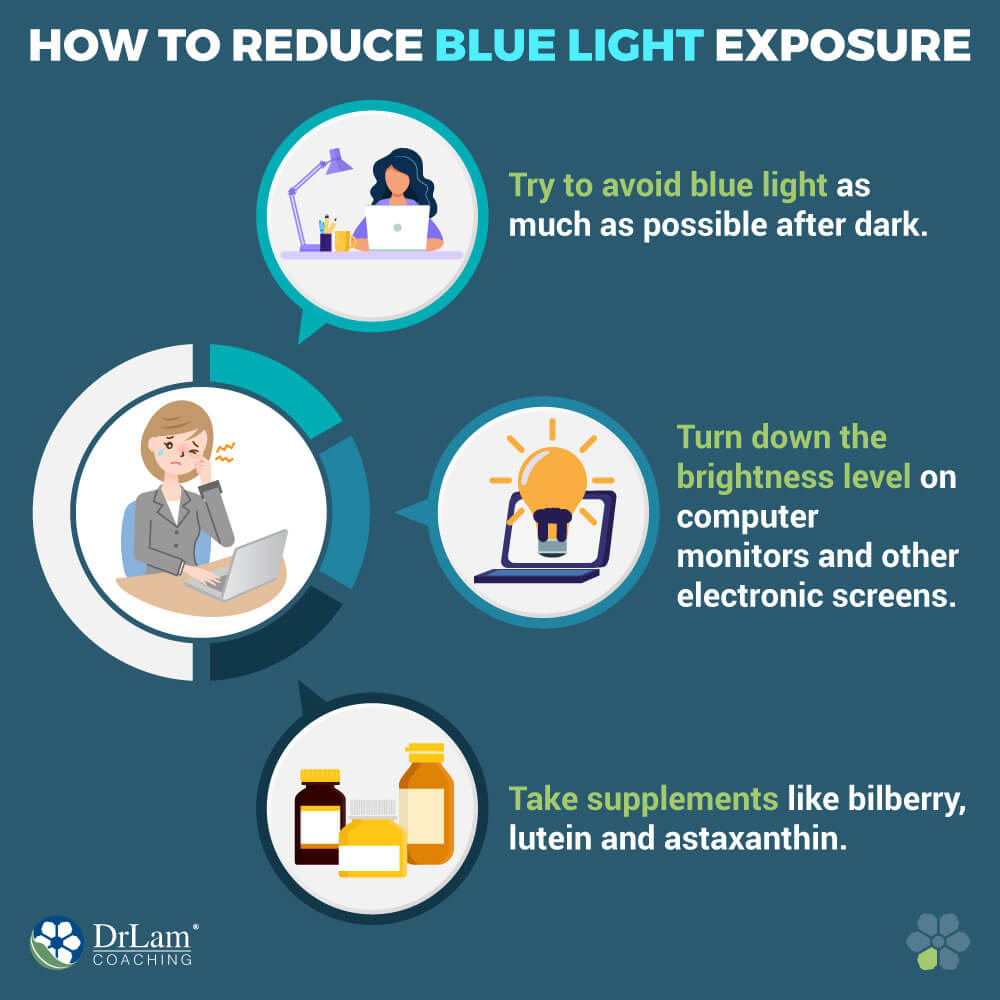
The human body needs the full spectrum of light to be healthy. This means you shouldn’t completely block or eliminate every particle of blue light from your life. But too much exposure to this type of light can have major implications for your health. Here’s how to avoid some of the potential health consequences associated with blue light:
If you suffer from AFS, it’s important to take steps to reduce your exposure to blue light. The key to AFS recovery is to remove stress and damaging toxins. Although you may not think of light as a problem, evidence suggests the opposite is true. Another way to improve your health is to focus on exposing yourself to other light spectrums. If you’re getting too much blue light, it probably means you aren’t getting enough of other wavelength, and this could have widespread consequences on your health and on your AFS recovery.
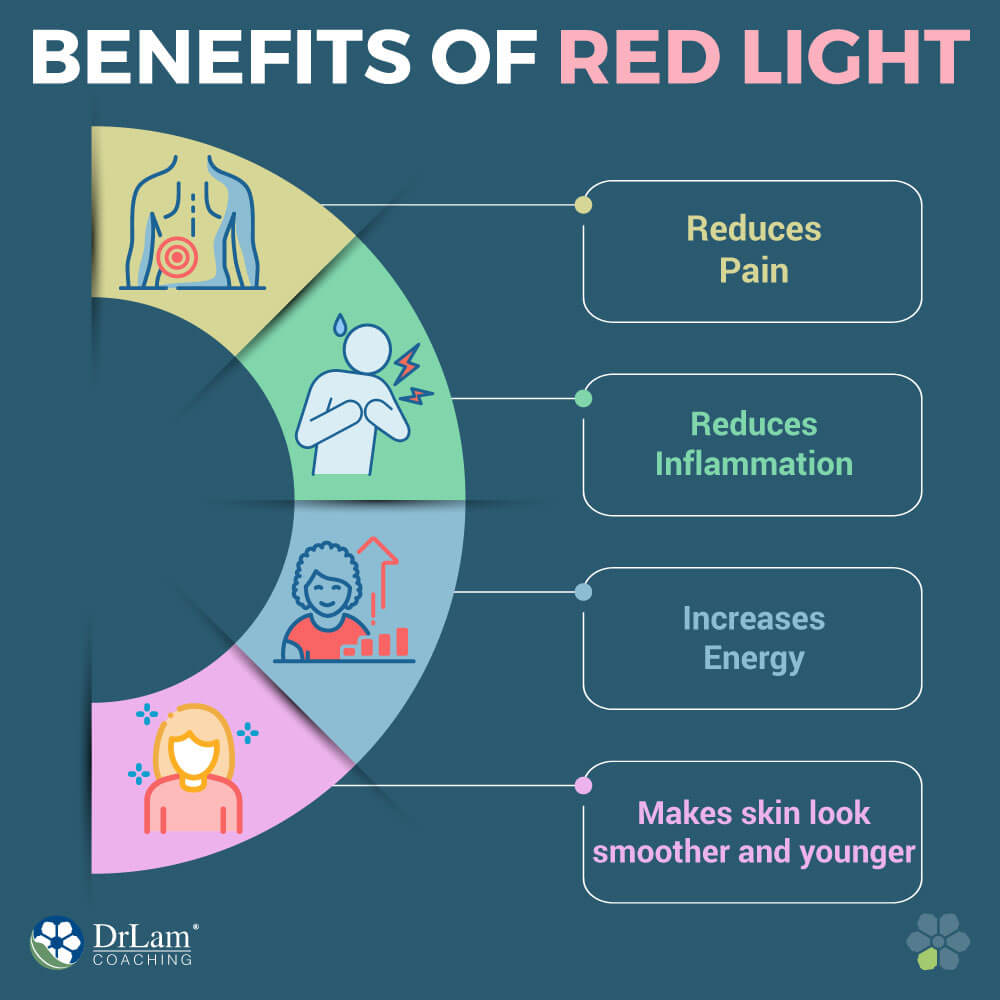
One of the problems with overexposure to blue light is that you probably aren’t getting enough exposure to the red-light spectrum. You may commonly hear that you should avoid the sun, wear sunscreen whenever you’re outside, and use sunglasses to protect your eyes. While this is good advice and may help you avoid skin cancer, it doesn’t mean that you should avoid the sun completely. By blocking sunlight entirely, you deprive your body of the spectrums of light that are absolutely essential for your health. The end result is too much blue light and not nearly enough exposure to other necessary light spectrums like red light.
Getting enough red light can have positive benefits for your body, especially anti-aging benefits. Here are some of the benefits you’ll enjoy when you increase your exposure to red light:
Studies have shown that exposure to red light can reduce pain and improve healing. This can be extremely beneficial if you’re suffering from AFS. There is no easy way to improve Adrenal Fatigue. The best approach is to reduce your stress levels and give your body everything it needs to heal. Red light can be a safe non-invasive way to speed up the natural healing process and enjoy better health sooner.
Inflammation is a serious and growing problem in the modern world. It’s linked to cancer and heart disease as well as AFS. If you’re suffering from AFS, chronic inflammation can create a toxic environment inside your body. This can increase stress levels, which further stimulates the ANS and worsens Neuroaffect Circuit imbalances. By using red light to decrease inflammation, you can encourage your body to become more balanced again.
Red light can help increase your overall energy levels. It is believed to have a biochemical effect in cells that strengthen mitochondria. By improving the function of mitochondria, the body’s energy factories, you may start to notice some impressive whole-body effects. And if you’re suffering from AFS this could be very beneficial indeed. Adrenal Fatigue causes general fatigue that cannot be eliminated with rest. Red light could be an easy and effective way to reduce or eliminate tiredness and give you the energy you need to fully live your life again.
Red light is particularly good for anti-aging because it increases the density of collagen, decreases skin roughness, and helps to mend skin damage. This could leave you with smoother younger-looking skin.
Increasing your exposure to red light, as well as other light spectrums, could have amazing benefits for your overall health, especially if you suffer from AFS. The easiest way to achieve this is to get more sunlight.
Growing worries about the damaging effects of the sun have scared many people wear sunscreen for even the shortest length of sun exposure. But this is probably overkill. The human body needs sunlight and the various spectrums of light that it emits. In fact, avoiding the sun may be more damaging to health than sunbathing. Here are some of the health benefits you’ll enjoy from regular sunlight exposure:

This doesn’t mean you should go out and sit in the midday sun until you’re burnt to a crisp. As with most things, the key is moderation. Try to sit out in the morning sun for 20 minutes every day. Let the sun fall on as much skin as possible and take off your sunglasses for a while because your eyes need sunlight too. This will increase your exposure to more natural wavelengths of light and improve your overall health.
Reducing your blue light exposure can have a variety of positive effects for your general health, and for your brain in particular. If you suffer from AFS, making this small change could be even more beneficial to you. It will allow you to lower the amount of toxins you’re exposed to on a daily basis, which could decrease your stress levels. But you can do even more to improve your AFS symptoms by limiting your exposure to blue light and increasing your exposure to other light spectrums. Numerous studies point to the widespread benefits that exposure to other light spectrums, such as red light, can have for your Neuroaffect Circuit, and your brain in particular. The Dr. Lam Coaching team can offer you a free** no-obligation phone consultation at +1 (626) 571-1234 where we will privately discuss your symptoms and what your options are. You can also send us a question through our Ask The Doctor system by clicking here.
By now, most people know that blue light can affect sleeping patterns and circadian rhythms. But new evidence suggests that the light from your computer screen may also have a negative effect on your energy levels, metabolism, and eye health.
